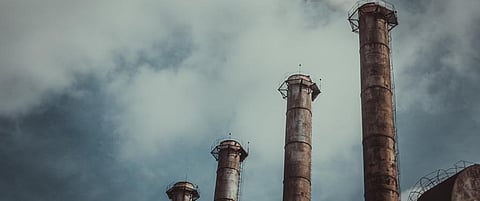

Gujarat Chief Minister Vijay Rupani launched India’s first trading programme to combat particulate air pollution on World Environment Day 2019, which has air pollution as its theme.
The programme is a market-based system where the government sets a cap on emissions and allows industries to buy and sell permits to stay below the cap.
Being initiated in Surat by the Gujarat Pollution Control Board (GPCB), the emission trading scheme (ETS) was designed with the help of a team of researchers from the Energy Policy Institute at the University of Chicago (EPIC), the Economic Growth Center at Yale University and others from The Abdul Latif Jameel Poverty Action Lab (J-PAL).
Under the cap and trade system, the regulator first defines the total mass of pollution that can be put into the air over a defined period by all factories put together.
Then, a set of permits is created, each of which allows a certain amount of pollution, and the total is equal to the cap.
These permits are the quantity that is bought and sold. Each factory is allocated a share of these permits (this could be equal or based on size or some other rule).
After this, plants can trade permits with each other, just like any other commodity on the National Commodity and Derivatives Exchange Limited (NCDEX).
“The reason for trading is that in a cap and trade market, the regulator will measure pollution over a period of time and industries must own enough permits to cover their total emissions,” said EPIC.
“Factories who find it very expensive to reduce pollution, will seek to buy more permits. Those who can easily reduce pollution are encouraged to do so because then they have excess permits to sell,” it added.
Eventually, after buying and selling by plants that find it cheap to cut pollution and those for whom it is expensive, most pollution is taken care of. Whatever the final allocation, the total number of permits does not change so the total pollution is still equal to the predefined cap. And yet the costs to industry are decreased, EPIC explained.
GPCB chose Surat as it is a densely-populated industrial centre where textile and dye mills cause a significant amount of air pollution. It will be implemented across 350 industrial units in the city in a phased manner, with around 160 units in the first phase.
“With this programme, we are kicking off a new era of cleaner production, while lowering industry compliance costs and rewarding plants that cut pollution in low-cost ways,” said GPCB chairman, Rajiv Kumar Gupta.
He added that on July 1, around 150 units will test trade on NCDEX and on August 1, the ETS will be launched full-fledged across all industrial units in the city.
Under existing regulations, every industry has to meet a certain maximum concentration of pollutants when it is operating. They are tested occasionally and manually (one or two times a year). However, there is widespread non-compliance across India. This is partly because penalties are rarely applied, in large part because they involve punishments such as closing down the entire plant which is not necessarily appropriate for small violations, said EPIC.
For now, the government has set a cap on concentration of emissions for each industrial unit at 150 microgramme per cubic metre (ug/m3), which is the 24-hour average for emission standard set by the Central government for industrial units.
Globally, cap-and-trade systems have been used to reduce other forms of pollution, such as programmes that have successfully reduced sulphur dioxide (SO2) and nitrogen oxides (NOx) in the United States. But the Gujarat programme is the first in the world to regulate particulate air pollution.